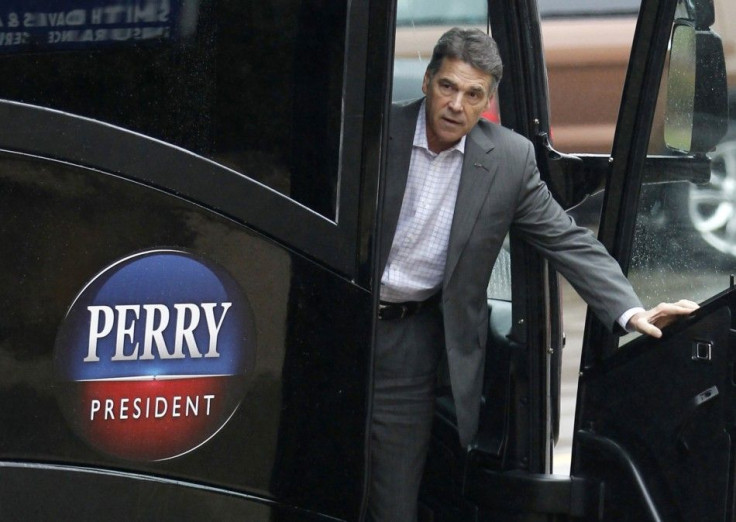Rick Perry 2016: Is Running For President In His Future Plans? He's A Likely Candidate, Longtime Aide Says

Rick Perry may have given his farewell address to the Texas Legislature on Thursday and wrapped up his record 14 years as governor of the Lone Star State, but that doesn’t mean Perry is going to do the Texas two-step off the national stage. Perry ran for president in 2012, and there are strong indications that he will seek the GOP nomination again in 2016.
“I believe that he is seriously contemplating and preparing another presidential campaign. He’s been spending a good deal of time in Iowa, New Hampshire, South Carolina -- the early primary states -- and preparing from a policy and a political standpoint,” said longtime former aide Ray Sullivan, who served as Perry’s chief of staff and communications director for Perry's 2012 presidential campaign and now runs the Austin-based consulting firm Sullivan Public Affairs. “I do think that he’ll quickly transition into a likely candidate for the Republican nomination.”
One of the ways Perry is signaling a potential run for president is by what he hasn’t done, according to Cal Jillson, a political science professor at Southern Methodist University in Dallas. A Texas public official since 1985, he hasn’t lined up a post-gubernatorial gig. It wouldn’t make sense for Perry to go into lobbying, political consulting or another private sector job just to leave it weeks or months later to announce he is running for president.
“I think that he’ll avoid doing anything between now and then that will interfere with his presidential run,” Jillson said. “Those things complicate a presidential run and you notice [former Florida Gov.] Jeb Bush has been resigning all his corporate board seats and other entangling obligations to potentially run for president.”
Perry’s farewell address also gave some clues. In the speech, Perry denounced a bloated federal government that he said instead “must do a few things, and do them well, and that Texans, uninhibited by overtaxation and excess regulation, can make the most of freedom.” He also slammed President Barack Obama for giving a “false choice … about projects like the Keystone [XL] Pipeline, between a clean environment and a strong economy.”
As the chief executive of the second-largest state with a long history in government -- Perry has held some form of elected office for nearly half of his 64 years -- Perry would be highly sought after for any manner of jobs, according to Michael Heaney, a political science professor at the University of Michigan. “Rick Perry’s not headed for unemployment. Rick Perry has options,” Heaney said. “Obviously, the question is: What does he want to do?”
Even if Perry comes up short in his second bid for the presidential nomination in 2016, his national political aspirations may still not necessarily be sidelined. The former Texas governor “would certainly accept a vice presidential nomination if his road to the nomination was closed,” Jillson said, but his chances at the second slot on the ticket depend on who wins the nomination.
If someone like Bush, who has deep ties to Texas despite living in Florida, Sens. Rand Paul of Kentucky or Ted Cruz of Texas is the nominee, Perry would most likely not be in consideration due to the desire for geographic balance on the ticket. “If say a Chris Christie or a Scott Walker -- someone from the northern tier of states were the nominee, they would be looking to the southern tier of states,” Jillson said, referring to the Republican governors of New Jersey and Wisconsin.
Perry also would be highly sought after in the private sector. He ran Texas for 14 years, built a national profile and made political connections throughout his 30 years in government. That kind of experience is attractive to banks, large corporations and consulting firms. “High-ranking public officials have extensive Rolodexes, and in that Rolodex is everyone who matters, particularly for a big state like Texas,” Jillson said. “Major banks and investment companies want former public officials not because of their own depth of their expertise, but because of the contacts they made when they [were] in office.”
Another option for Perry -- a quiet retirement -- is not a consideration, according to Sullivan. “He’s very energetic, he’s very engaged and is relatively young and certainly very fit and healthy,” he said. “He’s not the vacationing type.”
© Copyright IBTimes 2025. All rights reserved.






















